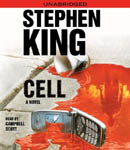
 The Dark Worlds Of H.P. Lovecraft Volume 4: The Rats In The Walls, The Shunned House, The Music Of Eric Zann
The Dark Worlds Of H.P. Lovecraft Volume 4: The Rats In The Walls, The Shunned House, The Music Of Eric Zann
By H.P. Lovecraft; Read by Wayne June
3 CDs – 2 Hours 41 Minutes [UNABRIDGED]
Publisher: Audio Realms
Published: 2006
ISBN: 1897304242
Themes: / Fantasy / Horror / Music / Atavistic Guilt / Cannibalism / Mushrooms /
Curse you, Thornton, I’ll teach you to faint at what my family do! … ‘Sblood, thou stinkard, I’ll learn ye how to gust … wolde ye swynke me thilke wys?… Magna Mater! Magna Mater!… Atys… Dia ad aghaidh’s ad aodaun… agus bas dunarch ort! Dhonas ‘s dholas ort, agus leat-sa!… Ungl unl… rrlh … chchch…
This collection from Audio Realms is the fourth in a series, and the second to be reviewed. There are three CDs and three complete and unabridged stories here, first published between 1922 and 1937. The tales are archaically constructed. If you sat down and try to read one of the paragraph-long sentences that Lovecraft wrote you’d probably begin to wonder why it actually works. Then if you considered that this is the guy who makes curious genealogists or amateur historians the center of his horror stories it becomes almost baffling how he manages to keep our attention at all. There is no doubt though: Lovecraft has our attention. I think I am on safe ground in calling him, at the very least, one of the true giants of Horror fiction. Here are three stories that will prove it…
The Rats In The Walls
The Delapore family, late of Massachusetts, has returned to its ancestral family estate in rural England. Their genealogical and historical research reveals that their ancestors have maintained a strange atavistic responsibility to the land and the ruin upon which their keep was built. Woe be to the friendly neighbors of the long-away Delapores, for the Delapore blood runs thick in their veins and loudly thrums with ancestral duty, as loudly perhaps as the “venimous slithering of ravenous rats in the walls.”
The Shunned House
The house of this story is reported to have been based on a couple of real houses that Lovecraft actually visited. One in particular in Providence, RI at #135 Benefit Street, as in the story, is supposed to be the main inspiration. This story also uses local Providence folklore and history for added depth, but I suspect that if even one fifth of the rest of this story were true we’d have to nuke Rhode Island from orbit, just to be sure. I think some people consider this to be one of Lovecraft’s lesser tales but this one really got me. I am probably a bit more mycophobic than your average person, though. If you don’t like mushrooms, or if you’re even a little afraid of them, listen to this one with the lights on.
The Music Of Eric Zann
One of the most frequently adapted of Lovecraftian tales. The narrator, a near-vagrant, recalls a fellow lodger of a mouldering lodging house in a mysterious French city. Erich Zann is being stalked by a nameless horror that comes to him at night. Only the eerie music he produced was not nearly as haunting as horror that chased him. First published in 1922, still powerful.
SFFaudio Essential narrator Wayne June is back! His grave rumbling voice and his letter perfect pacing makes each of these three tales a shuddersome experience. But I do have a one problem with this entry in the terrific Dark Worlds Of H.P. Lovecraft series. It isn’t the production; these CDs sound awesome. Wayne June’s reading of these three stories is absolutely definitive. His unaccompanied performance is utterly chilling – this series truly must be heard. It isn’t the packaging that is the problem, with original art by Allen K. The images on this series are reminiscent of the art found within the pages of the pulps in which these stories were first published. No, my problem isn’t with any of these things. My problem is with choice to censor a couple of lines of the text in The Rats In The Walls. It makes me want to cry. Maybe Lovecraft was indeed being a racist when he wrote the offending words (in naming Delacore’s cat “Nigger-man”), but I’m a purist. Instead of calling Delacore’s cat “Nigger-man” Audio Realms has changed it to “Blackman.” If the text is good enough to be republished year after year ought we not preserve it as it stands, racism and all? True horror is by its very nature transgressive, but I want all the horror in my life to be in fiction. A cannibalistic incestuous serial murderer of homeless children is scary in fiction but as long as its fiction I’m up for it. Keep all the racist crazy-talk in the fiction, I say, because that is where it all belongs.
Posted by Jesse Willis

 The latest Sonic Society podcast, likely inspired to start the Octobery frights early, is proud to present: Afterhell…
The latest Sonic Society podcast, likely inspired to start the Octobery frights early, is proud to present: Afterhell…




